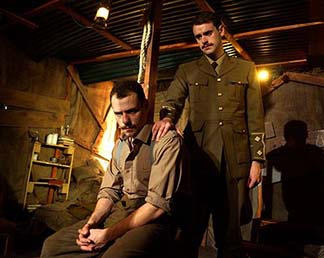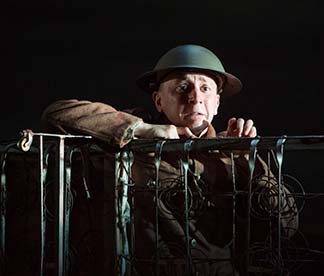By Lucy Komisar
The Edinburgh Fringe in August, the largest theater festival in the world, presents hundreds of plays as well as musicals, dance, comedy, cabaret and spoken word performances.
I chose political plays, and nine out of ten I saw were excellent. I divided them into three groups, repression, war and politics. Here‘s the second group, about war. “The Bunker Trilogy” and “Private Peaceful” about World War I and “The Collector” about more organized cruelty in Abu Graib.
“The Bunker Trilogy: Morgana”
Written by Jamie Wilkes, directed and designed by Jethro Compton, this is one of three plays that look at war – World War I in this 100th anniversary — through iconic western stories. This uses the Arthurian legend, the others Agamemnon and Macbeth. It is eerily superb.
You enter into a small dark space, benches on three sides, but you can hardly see them. Then your eyes get accustomed to the dim. There are dark wood planks that hold up canvas walls, a tin roof, a dirt floor. You glimpse sandbags piled up at an opening.
 Sam Donnelly as Lancelot and Hayden Wood as Arthur.
Sam Donnelly as Lancelot and Hayden Wood as Arthur.
Inside are three British soldiers in a bunker in No Man‘s Land between British and German lines. The play is about the ordinary and the horrible.
The characters from the story of King Arthur are Arthur (Hayden Wood), Lancelot (Sam Donnelly), Gwain (James Marlow) and Morgana le Fey (Bebe Sanders). They remind one that the glorification of war described in that story, and other legends, is a fraud. All the actors are fine in this ensemble performance, but I found Wood especially good
With horror outside the bunker, a bit of ordinary life goes on. The older soldiers tease the younger Gwain, who lacks experience with women. They talk about a German girl; could she have been the fat girl they saw on No Man‘s Land?
It‘s Christmas. Lance says, ˜When we liberate German women, it would be disappointing if they were porky.” So they are typical sexist males of the era. They do male jokes, male fantasies.
As they talk about venturing into the danger zones, Gwain argues, “This isn‘t about bravery, it‘s about principles.”
But he is contradicted, “We think of ourselves as knights.” Lancelot declares, “For King and country.” Killing for humanity.
Morgana provokes the youth‘s memory of Cornwell. And the song sounds, “Keep the home fires burning.” All fantasies for the World War I killing fields.
“The Bunker Trilogy: Morgana.” Written by Jamie Wilkes. Directed and designed by Jethro Compton.
“Private Peaceful”
Taking the British soldiers as individuals, “Private Peaceful” was adapted and directed by Simon Reade from the narrative by Michael Morpurgo, who wrote the story on which “War Horse” was based. It tells the story of Private Tommo Peaceful (vividly portrayed by Andy Daniel), a naive First World War volunteer who grew up in rural Devon, fell in love with a young woman who married his brother, and then enlisted at 16, below the legal age. Daniel bounds across the stage to create scenes and years.
Too much of the story is about his early life, showing he‘s a regular guy, but when it gets to wartime it is riveting.
There‘s propaganda fed to the young corn-fed guys: “If we don‘t beat them in France, the Germans will come through burning your village.”
And, “Your king needs you, your country needs you. It‘s every man‘s duty.” Tommo is goaded by an old lady who calls him a coward. Then we see the brutality visited on sweet innocent boys afflicted by foolish “patriotism.”
 Andy Daniel as ‘Private Peaceful,’ photo Jonathan Keenan.
Andy Daniel as ‘Private Peaceful,’ photo Jonathan Keenan.
Tommo and his brother join and army and go to France. He is gassed, and a German lets him go. His brother is wounded, and Tommo refuses to leave him to follow an order for a suicidal attack that would doubtless kill everyone on the mission. It is 1916. He will be brought up on death-penalty charges for cowardice. Never mind the stupidity of the commanding officers.
Morpurgo‘s inspiration for the play came from a visit to Ypres where he discovered how many young soldiers were court-martialed and shot for cowardice during the First World War. No problem for those giving suicidal orders. An important play on this 100th anniversary of the national conflicts that politics turns to war.
“Private Peaceful.” Adapted and directed by Simon Reade from the story by Michael Morpurgo.
“The Collector”
The horrors of the First World War appear mild compared to the suffering described in “The Collector,” which occurs less than a century later. It‘s inspired, of course, by the American prison at Abu Graib. But it‘s not just about American brutality against Muslim prisoners. It‘s about America‘s flouting of its moral commitment to people who believed its stated values and risked their lives to help the American project.
The play – unnerving and memorable — is written and directed by Henry Naylor, a British TV and radio writer. The characters are three U.S. officers – a southern reservist, a female interrogator and a nasty officer, and two Iraqis, a woman and her boyfriend, a great fan of America and its culture. It‘s 2003. We see only Captain Kasprowicz, the reservist (William Reay), Sergeant Foster the chief interrogator (Lesley Harcourt) and Zoya, the narrator (Ritu Arya), fiancée of an Iraqi interpreter. The play is three interwoven monologues. The actors are excellent, with Arya especially moving.
 William Reay as Captain Kasprowicz, Ritu Arya as Zoya, photo Rosalind Furlong.
William Reay as Captain Kasprowicz, Ritu Arya as Zoya, photo Rosalind Furlong.
In an unsettling literary contradiction, Zoya‘s opening sets the horror as poetry:
“Here is the land of magic and genies and flying carpets.
Of tyrants and despots and murderous Ba‘athists.
A land of sweetmeats and Turkish delights,
Of Sinbad and Saddam and Arabian Nights.
It‘s a magical nation of fable and mystery
A place with a long and ancient history
Boasting a rich and combustible soil,
Fertilized with blood and soaked in oil.
Writing began here and even drawing,
And beating with hoses and waterboarding.
Ours is the story of all mankind
Of the triumphs and failings of the human mind.
So if you‘re with us, or against us, pull up your chairs
And share with us these Arabian nightmares.”
Colonel ˜Kasper‘ Kasprowicz is a tough, charismatic American reservist in his mid-40s. He runs Mazrat prison, a former Saddam jail turned into an American lockup. Reay makes him realistic and sympathetic.
Young Nassir, who we never see, works in a warehouse and plays western pop music, particularly Eminem. He does gigs, he collects and sells CDs. He’s collecting American pop culture. He learns English from his hip-hop collection. From there, the ironic title. He loves America and signs on as an interpreter in the U.S. detention center.
The story tells how American brutality turns Nassir from a friend to a victim to a deadly enemy. It‘s a powerful metaphor for the U.S. in Iraq. How America destroyed Iraq and its own values. It shows that man‘s greatest enemy is his own brutality.
Sgt. Foster is the good cop, but she can‘t compete against the loudmouth Vallay, the prototypical American abuser. He puts prisoners in a dress, asserting, “If you humiliate them they‘re more ready to talk.” Harcourt is good as the kind of interrogator you wish the Americans had. We don‘t see Vallay.
After an explosion, the U.S. picks up everyone in the area, 300 to 400 people, many innocents. Faisal, a leading Saddamist, escapes. Fearful, Nassir asks for protection, for asylum for him and Zoya. He doesn‘t get it. He‘s told “There are procedures.” He starts wearing a balaclava to hide his face.
The story is a thriller, about what happens to Nassir and how he reacts. Arya gives unsettling poetic voice to Zoya:
“… our richest crop is political crisis
And our latest harvest is that of Isis.
But they aren‘t our real foe – nor Al-Qaeda, nor Saddam,
The real foe is deep in the heart of man,
For the history of Iraq shows a chilling reality
That man‘s greatest enemy is our own brutality.”
The play is vivid, mesmerizing and, inevitably, chilling.
“The Collector.” Written and directed by Henry Naylor. Review also at NY Theatre Wire.


Pingback: Edinburgh Fringe: plays about war and its fallout | The Komisar Scoop